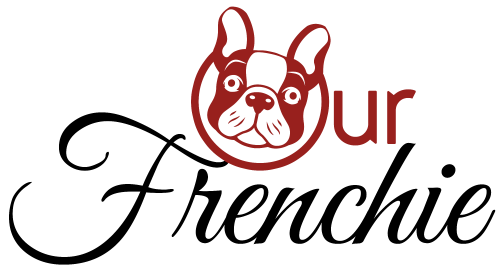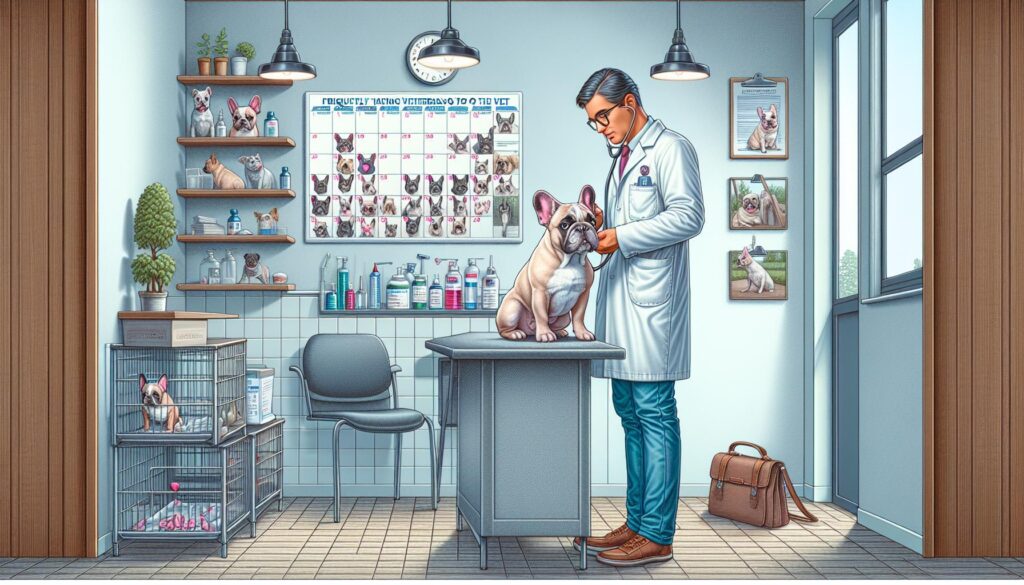About
How Often Should You Take a French Bulldog to the Vet?
Page Contents
Owning a French Bulldog is a rewarding experience, but it comes wiht its own set of responsibilities, especially when it comes to their health. Known for their charming personalities and distinctive looks, French Bulldogs require regular veterinary care to ensure they lead happy and healthy lives. But how often should you take your Frenchie to the vet? Understanding their unique health needs and the common issues they face can help you establish an appropriate vet visit schedule. In this article, we’ll explore the recommended frequency of vet visits for French Bulldogs and what you should expect during these appointments.
Understanding French bulldog Health Needs
French Bulldogs, known for their charming personalities and distinctive bat-like ears, have unique health needs that require careful attention. As a brachycephalic breed, they are predisposed to specific health issues such as respiratory problems, skin allergies, and hip dysplasia. Understanding these potential health challenges is crucial for ensuring your French Bulldog leads a happy, healthy life.
To maintain optimal health,it’s vital to be vigilant about the following:
- Respiratory Health: Due to their short snouts,French Bulldogs often face breathing difficulties. Regular check-ups can definitely help monitor and manage any respiratory concerns.
- Skin Care: Their skin folds can harbor bacteria and moisture, leading to infections. Routine vet visits can definitely help address skin conditions early.
- Joint Health: Keep an eye on their mobility, as they are prone to joint issues like hip dysplasia. Your vet can provide guidance on maintaining joint health through diet and exercise.
regular veterinary visits, ideally every six months, are recommended to keep track of these potential health issues. These visits allow for early detection and treatment, ensuring your French Bulldog remains in the best possible health. Remember, proactive care is key to managing the unique health needs of this delightful breed.
Puppy Vet Visits: Setting a Healthy Start
During the early months of a French Bulldog’s life, regular veterinary visits are crucial to ensure they are growing healthily and to catch any potential health issues early on. **Puppies typically require more frequent vet visits** compared to adult dogs. These initial appointments are essential for setting the foundation for a lifetime of good health.
**Key aspects of puppy vet visits include:**
- **Vaccinations:** Puppies need a series of vaccinations to protect them from common canine diseases such as parvovirus,distemper,and rabies. These are usually administered every 3-4 weeks until they are about 16 weeks old.
- **Physical Exams:** Regular check-ups allow the vet to monitor your puppy’s growth,check for congenital issues,and assess their overall health. These exams typically occur alongside vaccination appointments.
- **Parasite Prevention:** Puppies are vulnerable to parasites like fleas, ticks, and worms. Your vet will recommend a schedule for preventative treatments to keep these pests at bay.
Additionally,these visits offer an possibility to discuss any concerns you might have about your puppy’s diet,behavior,or training. Establishing a relationship with your vet during these formative months is invaluable, as it helps in creating a tailored health plan that supports your French Bulldog’s specific needs.
Adult Bulldogs: Routine Checkup Frequency
As your French Bulldog transitions into adulthood, maintaining a regular vet checkup schedule is crucial to ensure their continued health and well-being. Generally, adult French Bulldogs should visit the veterinarian for routine checkups at least once a year. These annual visits allow your vet to conduct a comprehensive health assessment, update vaccinations, and discuss any concerns you might have about your dog’s health or behavior.
During these visits, the veterinarian will typically:
- Perform a thorough physical examination to check for any signs of health issues.
- Update necessary vaccinations to protect against diseases.
- Discuss dietary needs and weight management to prevent obesity-related problems.
- Evaluate dental health and suggest cleanings or treatments if needed.
- Screen for parasites and recommend preventive measures.
**French bulldogs are known for their unique health challenges**,such as brachycephalic airway syndrome and skin allergies. Therefore, more frequent visits may be necessary if your dog shows signs of these conditions or if your vet recommends it.Staying proactive with regular vet visits not only helps in early detection of potential issues but also ensures that your French Bulldog leads a happy, healthy life.
Senior Bulldogs: Increased Vet Care Needs
As your French Bulldog enters its senior years, typically around the age of seven or eight, its healthcare needs will naturally increase. It’s crucial to schedule more frequent veterinary visits to ensure your furry friend remains healthy and agreeable in its golden years. **Regular check-ups every six months** are recommended to monitor for age-related issues such as arthritis, dental disease, and heart conditions that are more prevalent in older dogs.
During these visits, your vet will likely suggest a series of diagnostic tests to catch potential problems early. These may include:
- Blood work to assess organ function and detect any underlying conditions
- Urinalysis to monitor kidney health and screen for diabetes
- blood pressure checks to prevent hypertension-related complications
- Dental examinations to prevent periodontal disease
**Weight management and nutrition** also become increasingly critically important for senior bulldogs. Your vet can provide tailored advice on diet adjustments to help manage weight and support joint health. additionally, keep an eye out for any changes in behavior or mobility and report them promptly, as early intervention can significantly improve your dog’s quality of life as they age.
Recognizing Signs of Health Issues
As a pet owner,it’s crucial to stay attuned to your French Bulldog’s well-being by recognizing early signs of health issues. This proactive approach can make a meaningful difference in ensuring your pet’s long-term health. French Bulldogs, known for their unique physical characteristics, may be prone to certain health conditions, and being observant can help in addressing these concerns promptly.
Be vigilant for **changes in behavior or appetite**,as these can often be the first indicators of underlying health problems. A sudden lack of interest in food, excessive sleeping, or unusual aggression can all signal that something might be amiss. Similarly, keep an eye on their breathing patterns. Due to their brachycephalic nature, French Bulldogs may experience breathing difficulties, and any noticeable increase in labored breathing or snoring should be discussed with a veterinarian.
- **Skin and Coat:** Watch for signs of allergies or infections,such as excessive scratching,redness,or hair loss.
- **Eyes and Ears:** Look for discharge, redness, or swelling, which could indicate infections or other issues.
- **Mobility:** limping or reluctance to move might suggest joint pain or injury.
- **Digestive Health:** Monitor for vomiting,diarrhea,or constipation,as these can be symptoms of gastrointestinal problems.
By staying observant and knowing what to look for, you can ensure that your French Bulldog receives the timely care they need, keeping them healthy and happy for years to come.
Vaccination Schedule for French Bulldogs
Ensuring your French Bulldog is up-to-date with vaccinations is crucial for their health and well-being. Like all dogs, French Bulldogs require a series of vaccinations to protect them from various infectious diseases. **Puppy vaccinations** typically start at 6-8 weeks of age and are repeated every 3-4 weeks until they are about 16 weeks old. These early vaccinations include protection against diseases such as distemper,parvovirus,and adenovirus. Additionally, the rabies vaccine is usually administered at around 12-16 weeks.
As your French Bulldog matures, **booster shots** become an important part of their healthcare routine. Adult dogs generally require booster vaccinations every 1-3 years, depending on the specific vaccine and your veterinarian’s recommendations. It’s essential to keep a record of your dog’s vaccinations and consult with your vet to tailor a schedule that suits your dog’s lifestyle and local disease risks.
- core Vaccines: These include rabies, distemper, parvovirus, and adenovirus.
- Non-Core vaccines: Depending on your location and lifestyle,your vet might recommend vaccines for bordetella,Lyme disease,or leptospirosis.
Regular vet visits will help ensure that your French Bulldog stays protected against diseases, and your veterinarian can provide guidance on any additional vaccines that may be necessary based on your pet’s specific needs and surroundings. Prioritizing their vaccination schedule is a fundamental step in maintaining their overall health and longevity.
Parasite Prevention and Control Measures
- **Flea and Tick Prevention:** French Bulldogs, like all dogs, are susceptible to fleas and ticks, which can lead to discomfort and transmit diseases. Regular use of veterinarian-recommended topical treatments, oral medications, or flea collars can effectively keep these pests at bay. It’s crucial to follow your vet’s guidance on the best products and frequency of submission to ensure your Frenchie is protected year-round.
- **Heartworm Prevention:** Heartworm disease is a serious condition that can be fatal if not prevented. Administering monthly heartworm preventive medications is essential. These medications are often combined with flea and tick preventives for convenience.Your vet can perform a simple blood test to ensure your French Bulldog is heartworm-free before starting a preventive regimen.
- **Intestinal parasite Control:** Regular deworming is vital to protect your French Bulldog from internal parasites like roundworms, hookworms, and tapeworms. Puppies may require more frequent deworming, while adult dogs should follow a schedule recommended by your vet. Routine fecal exams can definitely help detect any parasitic infections early, allowing for prompt treatment.
Dental Care: Importance of Regular Checkups
Maintaining your french Bulldog’s dental health is crucial not only for their oral hygiene but also for their overall well-being. regular dental checkups can definitely help prevent common issues such as plaque buildup, gum disease, and tooth decay, which can lead to more serious health problems if left untreated.It’s essential to schedule dental examinations at least once a year, although some veterinarians might recommend more frequent visits depending on your dog’s specific needs.
During these checkups, the vet will thoroughly examine your dog’s mouth, looking for signs of dental disease and ensuring that their teeth and gums are healthy. They may also perform professional cleanings to remove any tartar or plaque that regular brushing at home might miss. **Regular dental care** can definitely help avoid painful conditions and costly treatments in the future.
- Prevents bad breath and oral discomfort.
- Reduces the risk of infections that can spread to other organs.
- Helps maintain a healthy diet by ensuring your dog can chew properly.
In addition to professional checkups, it’s important to incorporate at-home dental care routines. Brushing your French bulldog’s teeth with vet-approved toothpaste and providing dental treats or toys can significantly contribute to their oral health. Consistent care both at home and at the vet will ensure your furry friend has a healthy smile for years to come.
To Conclude
regular veterinary visits are essential for maintaining your French Bulldog’s health and well-being. By scheduling routine check-ups, you can catch potential health issues early, ensure vaccinations are up to date, and receive tailored advice for your pet’s specific needs. Remember, a proactive approach to your Frenchie’s health can lead to a happier, longer life for your beloved companion. Always consult with your veterinarian to determine the best visit schedule based on your dog’s age,health status,and lifestyle. Your attentive care today sets the foundation for many joyful years together.

